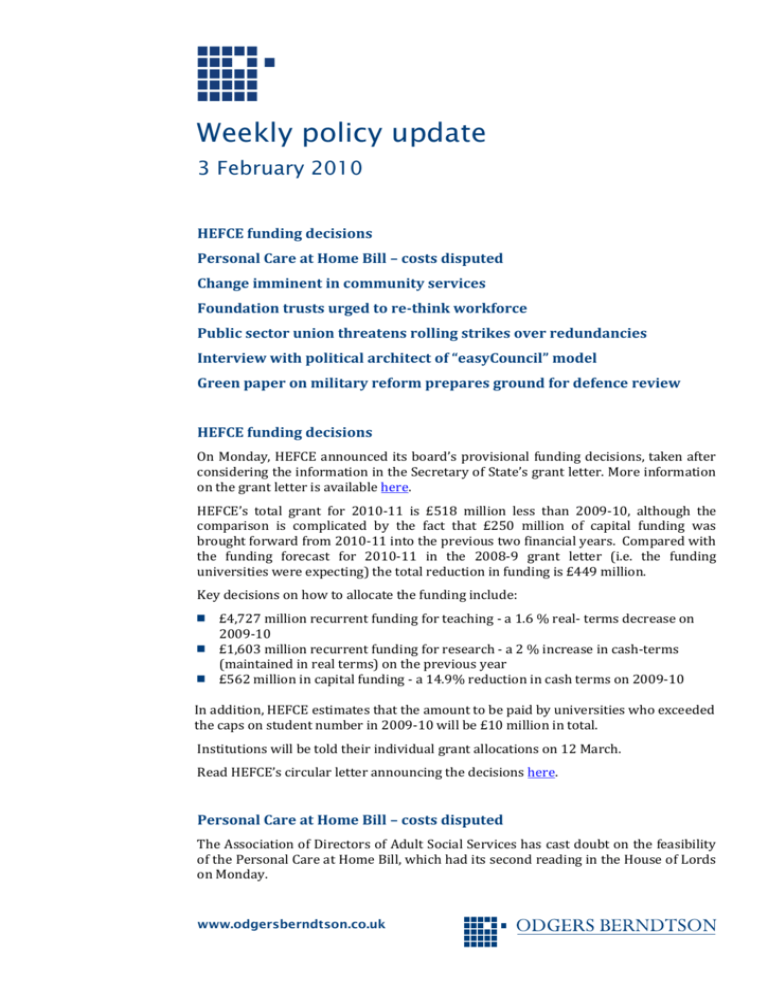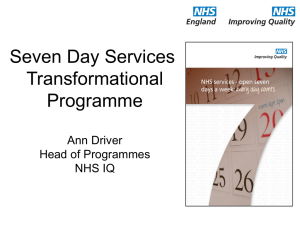Weekly policy update
advertisement

Weekly policy update 3 February 2010 HEFCE funding decisions Personal Care at Home Bill – costs disputed Change imminent in community services Foundation trusts urged to re-think workforce Public sector union threatens rolling strikes over redundancies Interview with political architect of “easyCouncil” model Green paper on military reform prepares ground for defence review HEFCE funding decisions On Monday, HEFCE announced its board’s provisional funding decisions, taken after considering the information in the Secretary of State’s grant letter. More information on the grant letter is available here. HEFCE’s total grant for 2010-11 is £518 million less than 2009-10, although the comparison is complicated by the fact that £250 million of capital funding was brought forward from 2010-11 into the previous two financial years. Compared with the funding forecast for 2010-11 in the 2008-9 grant letter (i.e. the funding universities were expecting) the total reduction in funding is £449 million. Key decisions on how to allocate the funding include: £4,727 million recurrent funding for teaching - a 1.6 % real- terms decrease on 2009-10 £1,603 million recurrent funding for research - a 2 % increase in cash-terms (maintained in real terms) on the previous year £562 million in capital funding - a 14.9% reduction in cash terms on 2009-10 In addition, HEFCE estimates that the amount to be paid by universities who exceeded the caps on student number in 2009-10 will be £10 million in total. Institutions will be told their individual grant allocations on 12 March. Read HEFCE’s circular letter announcing the decisions here. Personal Care at Home Bill – costs disputed The Association of Directors of Adult Social Services has cast doubt on the feasibility of the Personal Care at Home Bill, which had its second reading in the House of Lords on Monday. www.odgersberndtson.co.uk Document Title 2 According to a survey of 61 local councils carried out by the organisation, the cost to local authorities of providing free care at home to approximately 280,000 people with the highest care needs will be twice the £250 million estimated by the government. ADASS claim that the average weekly cost of providing care to those with high needs is £200 per week, as opposed to the £103 per week which the government figures supporting the bill allow for. The Department of Health is currently consulting on the regulations and guidance that should accompany the bill, and the consultation runs until 23 February. Summary and progress of the bill Department of Health Consultation Change imminent in community services The Health Service Journal reports that guidance which the Department of Health is due to publish shortly on the future shape of community services will encourage providers of those services (which include things like health visiting, community matrons, occupational therapy, palliative care, etc) to undertake so-called “vertical integration”. This is a form of merger, whereby providers of community services, rather than operating as discrete entities, are integrated into a larger provider of hospital care. The aim is to simplify care pathways, such that a patient’s care is more closely arranged around their needs, simplifying their journey through the healthcare system, and ultimately saving money by reducing costly, unnecessary hospital admissions. There has been considerable policy confusion recently around the provision of community services (which account for around two-fifths of the total NHS workforce) which are facing growing demand, downward pressure on budgets, and the introduction of pricing for their services (likely to lead to more aggressive commissioning and competition from the third and private sector). But the expectation is now that, by March 2011, providers of community services will have definitively separated from their former PCT parent organisations, and established themselves as social enterprises, vertically integrated providers, acquired Community Foundation Trust status, or else merged with Local Authority social care providers. You can read a policy briefing on trends in community services here. Foundation trusts urged to re-think workforce A copy of an internal report produced by the umbrella organisation the Foundation Trust Network (essentially a lobby/advocacy organisation for the NHS’ quasiautonomous Foundation Trusts) was leaked to the public sector union Unison. The report suggests that Foundation Trusts should fundamentally re-examine their workforces, in the short time remaining before budget freezes kick in from 2011, since an approach to headcount reductions which relied on “natural wastage” of posts would not save sufficient money, and would not produce the type of skills and workforce that the NHS will require in future. www.odgersberndtson.co.uk Document Title 3 The report was based on a survey of Foundation Trusts; it calls for a halt to pay progression for a couple of years, a cap on the top pensions, a reduction in the number of pay points in the Bands set by “Agenda for Change” (the national pay structure) and action to reduce absence through sick leave. Its leak comes as unions and NHS employers are due to begin discussing whether or not NHS staff should be encouraged to agree greater flexibility in their working conditions, in return for guarantees of job security. HSJ report available here. Policy briefings on NHS leadership and workforce available here. Public sector union threatens rolling strikes over redundancies The Public and Commercial Services (PCS) union, which thanks to its 270,000-strong membership, has a significant presence in Whitehall Departments and has a record of industrial action taken to fight controversial, large-scale workforce change at the heart of Government, has balloted its members on strike action in the spring, to embarrass the Government, in response to the Government’s decision to legislate to scale back civil servants’ severance payments. The Cabinet Office (with overarching responsibility for civil service reform) argues redundancy packages are overly generous, and should be brought into line with private sector levels. It hopes to save £500m over three years through the deal, which will be included in an order to be laid before Parliament at the end of the week. It has reportedly signed an agreement with five other, major public sector unions, who will not oppose the moves through strike action. Guardian Society report available here. Interview with political architect of “easyCouncil” model Mike Freer, the Conservative Councillor who was Leader of Barnet Council, when controversial plans were drawn up to drastically overhaul the way the local authority delivers services, along the lines of the easyJet business model, has given a detailed interview to the Guardian, justifying the “Future Shape of the Council” project. He is now the Conservative Parliamentary candidate for Finchley and Golders Green – a totemic seat for the Conservatives, since it was the stomping ground of Margaret Thatcher. The interview is significant, since it represents a full-length rationalisation of the efficiency model set out in the Future Shape project, which is widely seen as a blueprint for the types of reforms a probable future Conservative Government will push town halls to undertake; Barnet is a flagship Conservative Borough. In the interview, Freer glosses the Barnet model; it’s three-pronged. The first element is the “easyCouncil” one – concentrating on improving the quality of core services and extending charging for non-core ones. The second is improving efficiency through the merger of back-office functions with other public bodies in the area, dramatically reducing spending on administration and improving information-sharing for joint interventions. The final prong is a concerted attempt to intervene early and strategically to address those families with complex service needs, who place a disproportionate burden on Council and NHS resources. Guardian interview available here. www.odgersberndtson.co.uk Document Title 4 Green paper on military reform prepares ground for defence review Both the major parties are committed to conducting a strategic defence review – the process by which the long-term policy on the shape of the armed forces is determined – after the General Election. The current Government has published a Green Paper on its view on the reform of the services, in advance. The Green Paper recognises the need for closer and more effective cooperation with key NATO partners but there are no commitments on spending patterns in the future. The demands on the armed forces, and the prospect of spending cuts (in the absence of any guarantees on Departmental budgets for the MoD from either major party) is causing much political jostling for influence and position from the three branches of the services, and from major defence contractors eager to defend lucrative, long-term defence supply contracts and relationships. Meanwhile, a think-tank, the Centre for Policy Studies, has published More Bang for the Buck (available here), arguing that defence procurement has been deeply flawed and is urgent need of reform, to squeeze better value from suppliers. www.odgersberndtson.co.uk





